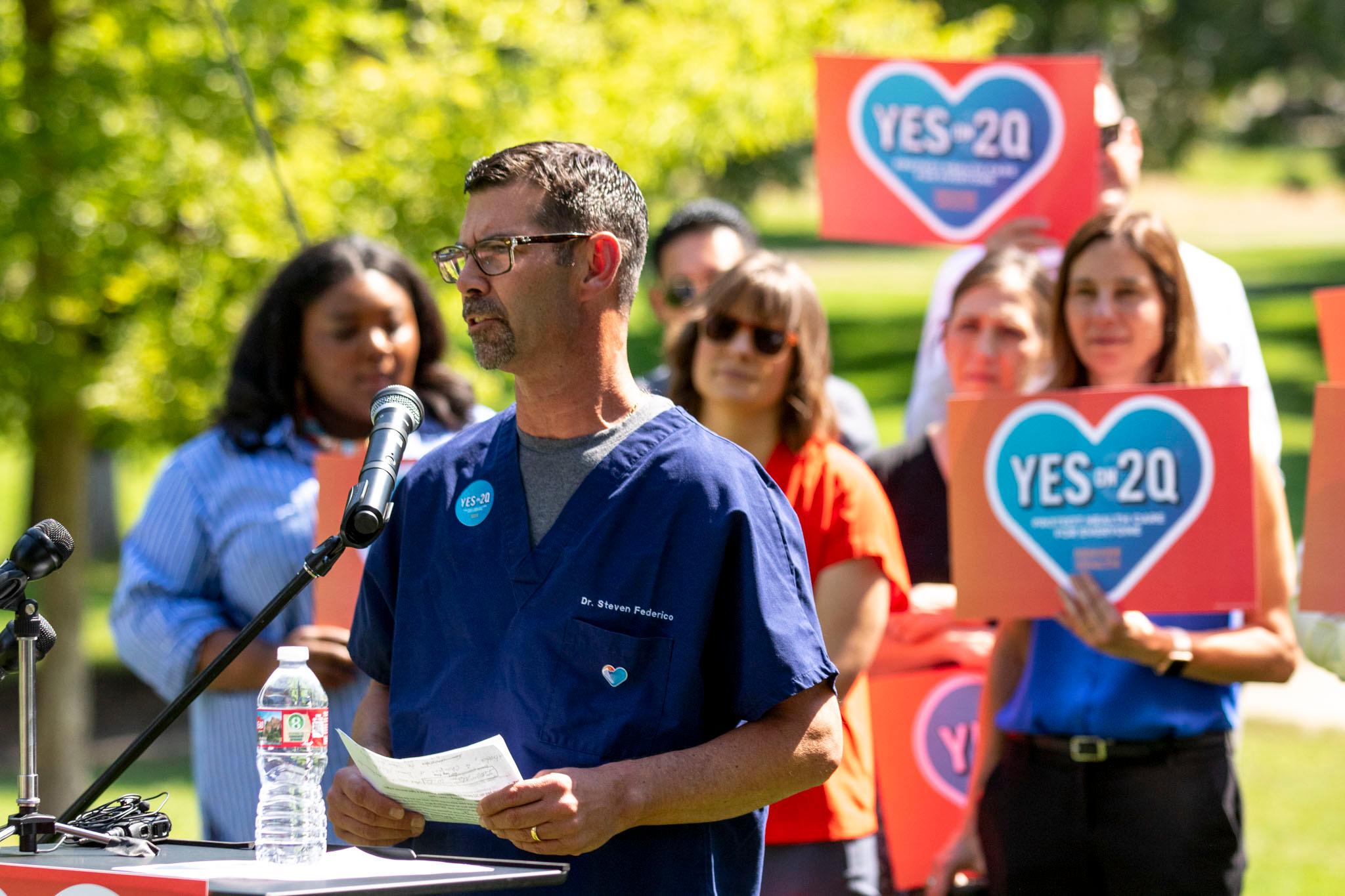Denver Health is on track to receive about $70 million a year in new funding to help fill a growing hole in its budget. Ballot Issue 2Q, a proposal to raise sales taxes in support of the hospital system, was leading as ballots were counted.
As of 10 p.m., the “yes” side had about 57 percent of the vote. The measure would need at least 50 percent of the final vote to pass. Roughly half of the city’s votes had been counted.
“It’s a big deal,” Denver Health CEO Donna Lynne said at a watch party in Denver. She said the system lost money in 2022, squeaked out a narrow surplus last year and will probably break even this year.
“No business can run in that kind of a roller coaster,” she added.
If approved, the new tax would add 3.4 cents to a $10 purchase in Denver, generating tens of millions of dollars for Denver Health.
The measure would add new costs for consumers in Denver just as the cost of living has dominated the 2024 election cycle. But several voters told Denverite it was a worthy cause.
“I'm OK with that because it benefits everyone in general. I've used it plenty of times, and I know other people that have benefited from using Denver Health,” said Lyndsey Saxon, a Denver voter. “It’s a really, really important asset we have.”
Lynne and other proponents, including prominent Colorado Democrats, argued that Denver Health’s funding crisis “threatens essential care and programs, putting vital services at risk.”
Denver Health is a “safety net” hospital where people can get medical care, whether or not they can pay.
Still a “tough road” ahead
With a win looking likely, Lynne said Denver Health’s focus now is investing in facilities and staff. “We need to invest in our people. We need to invest in technology. We need to build some new buildings. And you can't do that if you're not making any money,” she said.
She said Denver Health is not seeking to make a lot of money. “Some health systems do. We just really want to be able to invest back in our people and our organization.”
Speaking from a stage to a packed watch party at Spangalang Brewery in Denver’s historic Five Points neighborhood, Lynne said there was still a “tough road” ahead.
She noted the state’s budget won’t give Denver Health an increase in Medicaid reimbursements in their fiscal year 2026. “Our employees deserve a raise. Drugs cost more money. We need to invest in things,” she said. “So we've got some fights ahead of us.”
Another top Denver Health official said local voters realized the hospital’s positive impact.
“Every single event that we went to, somebody raised their hand and told us their Denver Health story,” Dr. Steven Federico, Denver Health’s chief government and community affairs officer, said. That included one person who was taken to the hospital after a bike accident.
“We literally saved their lives,” Federico said.
Another tax hike?
The sales tax for purchases in Denver is currently 8.81 percent, including taxes collected by the city, RTD and the state. The passage of the Denver Health measure would bring the rate to 9.15 percent. Another proposed sales tax increase, Ballot Issue 2R for affordable housing, would bring the total to 9.65 percent if it passes, too.
Kim Monson, president of the Colorado Union of Taxpayers, which opposed the tax increase, said the apparent victory of 2Q places an unnecessary burden on Denver taxpayers to cover financial gaps at Denver Health.
“Instead of turning to taxpayers for more funding, I believe Denver Health should focus on reducing executive costs and implementing stronger financial controls internally,” she said.
She pointed to a 2020 controversy in which more than $3 million of executive bonuses were awarded, even as the organization faced financial strain, prompting its leadership group to reduce their salaries.
“Taxpayer dollars shouldn’t be used to subsidize inefficiencies that could be managed within Denver Health's own budget,” Monsoon said.
More than $2 million behind the campaign
Backers of the proposal, raising money through a group called Healing Denver, carried a massive fundraising advantage into Election Day. As of Nov. 4, they’d raised almost $2 million in support of 2Q, according to the Denver Campaign Finance Dashboard.
The top contributors included Heart of Denver, Healthier Colorado, the Thiry O'Leary Living Trust and Gary Advocacy LLC, all giving more than $100,000. Lynne gave $80,000.
The “yes” campaign spent more than half of its reported expenditures on Karsh Hagan, an advertising agency based in Denver.
The opposition hadn’t raised any money.













